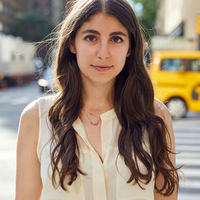You Can't Fool Christine Baranski
As Victoria in 'Nine Perfect Stranger' and Agnes in 'The Gilded Age,' Baranski takes on two very different yet equally strong roles this spring. Here, the actress discusses being Hollywood's go-to for savvy and sophisticated characters.
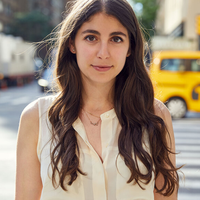
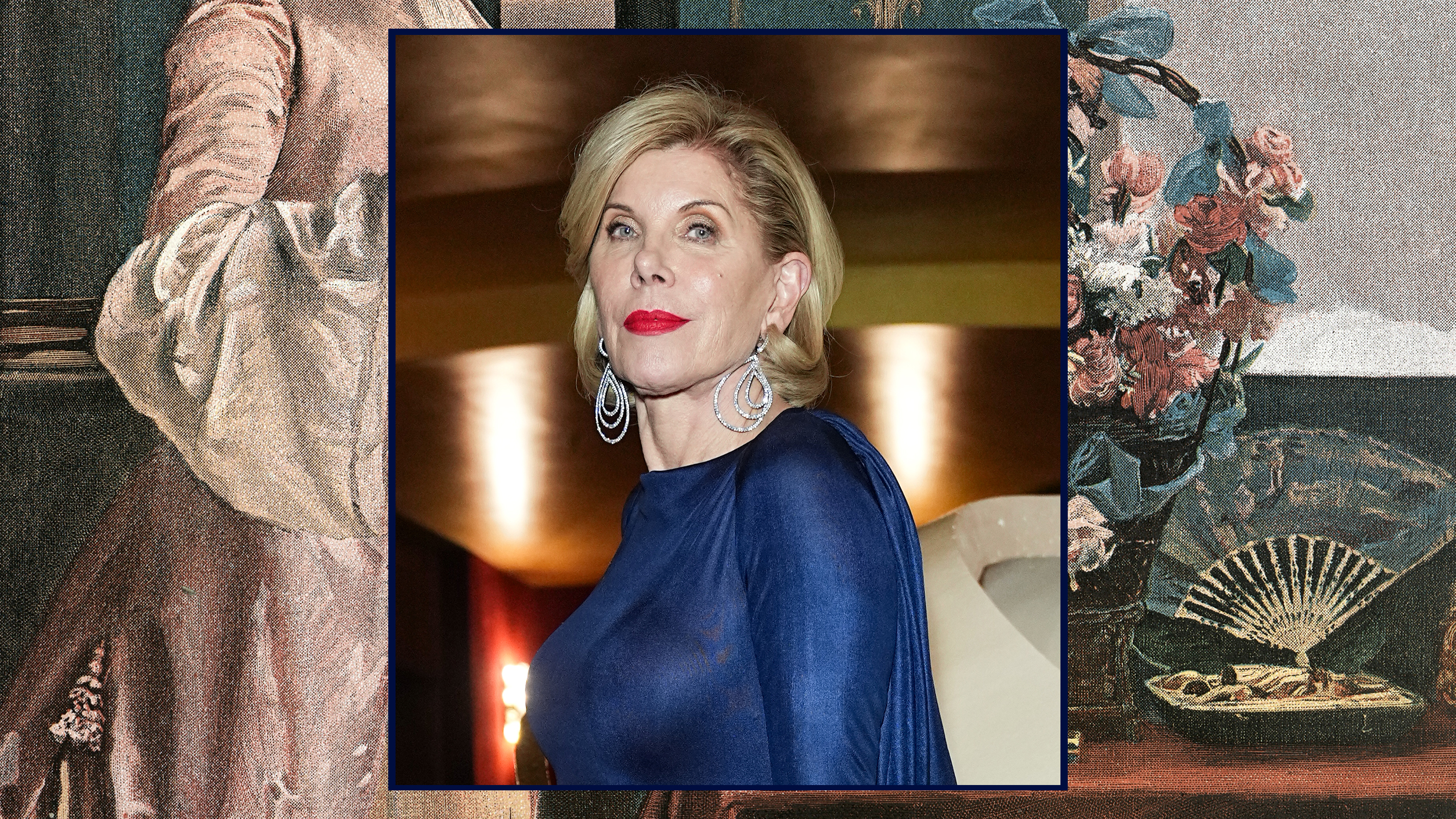
For the past 15 years, you’d be hard-pressed to find a time when Christine Baranski was not starring in a beloved TV show. Leapfrogging from legal drama The Good Wife to its spinoff The Good Fight to the dishy HBO period series The Gilded Age, the Emmy and Tony-winning actress has become the go-to name when it comes to finding someone to play a well-heeled, side-eying, champagne-sipping woman who takes no shit.
This spring, she excels at not one but two of those roles: Victoria, a self-described “neglectful but also smothering” mother with a secret on the shroomed-out second season of Hulu’s Nine Perfect Strangers; and Agnes, the uppity matriarch desperate to maintain her social standing on the third season of The Gilded Age, premiering June 22. “Strong women, women with a certain kind of flamboyance or a certain kind of wit—I’ve been playing characters like this since I left Juilliard,” Baranski tells Marie Claire over Zoom from her New York home. “It must be the raw material that is me,” she adds with her signature cheek.
The characters are wildly different (Victoria upends social norms by inviting her much younger lover, Matteo, to crash her mother-daughter trip while Agnes is more concerned with whether the staff at her Manhattan mansion will take orders from her instead of her newly wealthy sister). But it’s easy to see why Baranski is so perfectly cast in both shows. Breaking out in theater, then the ‘90s sitcom Cybil before landing scene-stealing roles in films like The Birdcage, Cruel Intentions, and Mamma Mia!, Baranski brings a sense of regality and knowing cleverness to characters both icy and zany.
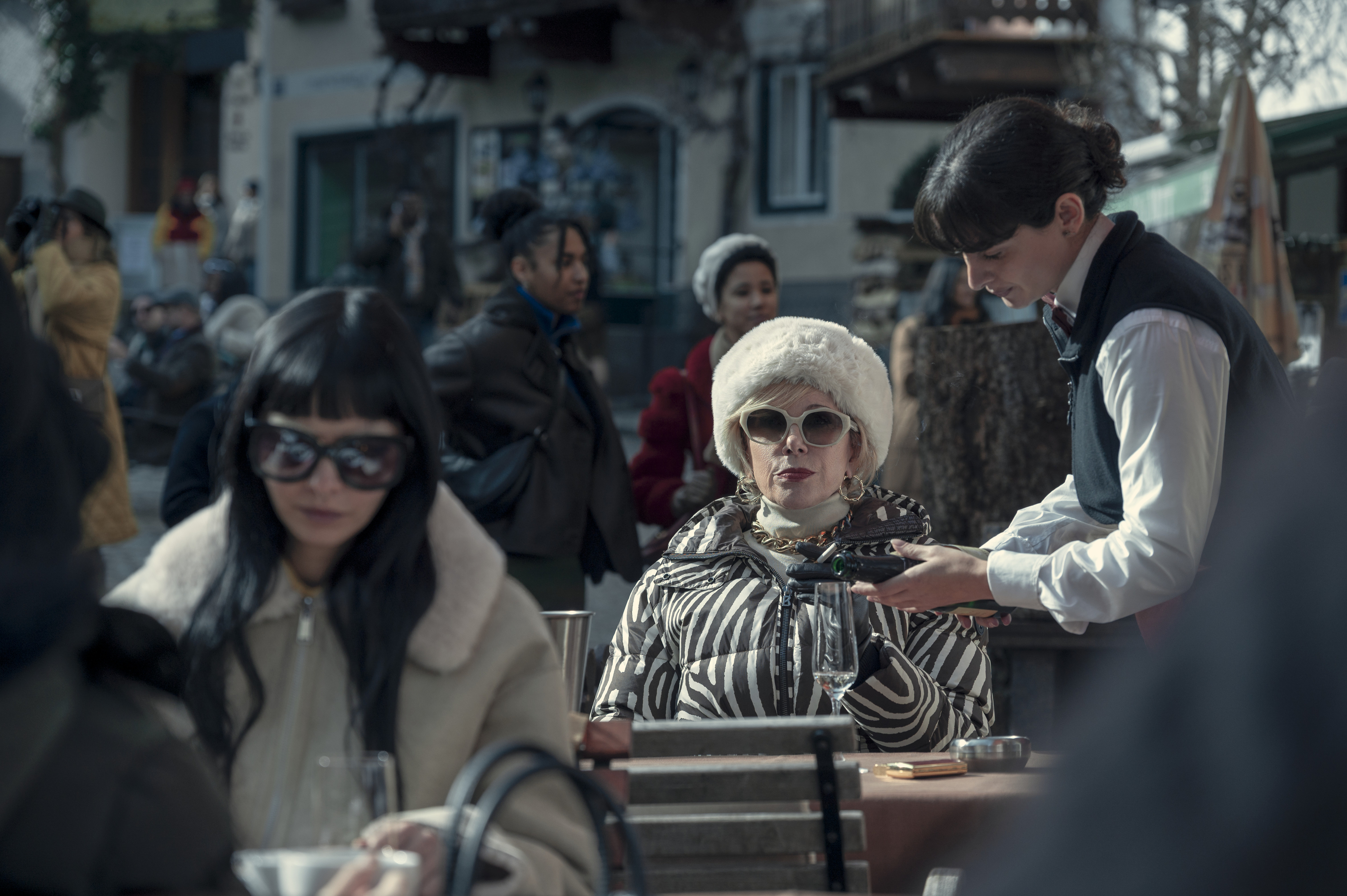
Victoria (Christine Baranski) visits a town in the Alps in Nine Perfect Strangers season 2.
In Nine Perfect Strangers, Baranski’s Victoria could be written off as cruel when she clashes with daughter Imogen (Annie Murphy) at Zauberwald, the mysterious resort where Masha Dmitrichenko (Nicole Kidman) engages in experimental psilocybin treatments. But as the season progresses, Victoria reveals to Imogen that she has early-onset ALS and she may only have a few months to live. What results is a touching reconciliation that hinges on Baranski’s grounded, tender performance.
“I don't think I'd be very good at being the long-suffering mom, or the victim, or the fragile one that's having trouble coping,” Baranski says of the roles she’s offered. “I love the fact that I've had a career playing these kind of ladies, because I think audiences love to see this a woman who's her own person, who doesn't suffer fools, who is highly opinionated, who makes mistakes, but still, as Elizabeth Taylor would say, puts on her lipstick, and pours herself a drink, and moves on. Great clothes, funny lines. I mean, what's wrong with that?”
Ahead, Baranski breaks down her unlikely friendship with co-star King Princess, what’s next on this season of The Gilded Age, and her dedication to mentoring actors both on-screen and off.
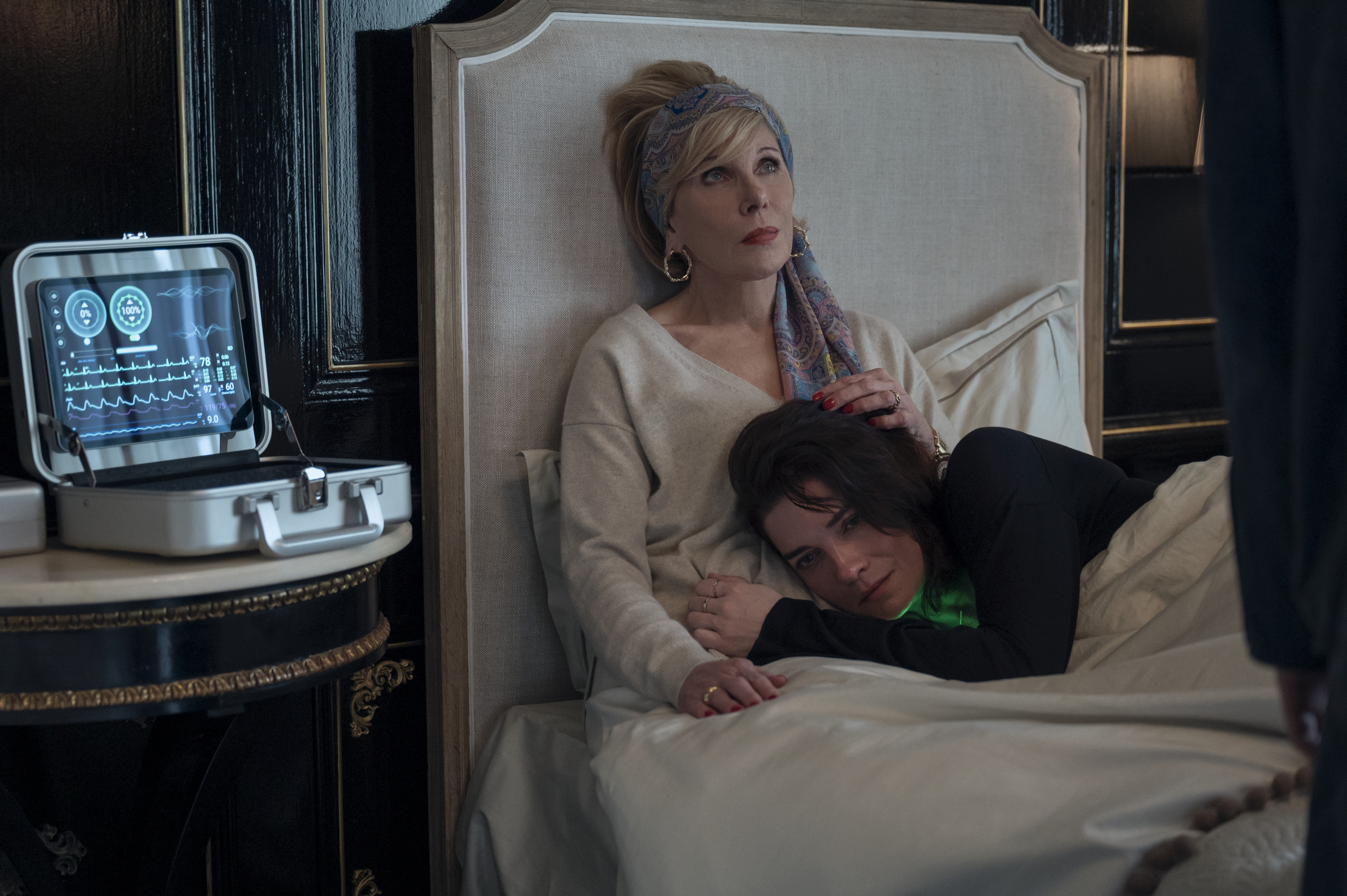
In episode 6, "The Other Side," Victoria comes clean about a secret she has been keeping from her daughter Imogen (Annie Murphy).
Marie Claire: What attracted you to Nine Perfect Strangers?
Get exclusive access to fashion and beauty trends, hot-off-the-press celebrity news, and more.
Christine Baranski: We filmed in Munich and the Alps. It will go down as one of my favorite experiences, in terms of location, because I'm a music and opera lover, and I love to study European history. It was like a year abroad, where you just inhale culture.
I knew Nicole was reprising her role and then I heard the list of the actors they were talking to. They were just marvelous actors. I got a little hint of what the character was and I thought she was interesting because of her predicament. Playing a mother-daughter relationship is always a rich experience. Having raised two daughters, that was something, like, "Oh, well, I have some life experience with the complicated psychology of a mother-daughter relationship." But I also thought it would be very interesting to explore the psychology of a woman who knows she's dying. ALS is a terrible, terrible disease. She's hiding that, walking with a cane, pretending that she had a little accident. She comes in all dolled up but, in fact, she's quite frail.
MC: You mentioned your “marvelous” colleagues. Any memories together from your time abroad?
CB: One magical evening we were in this little town of Hallstatt [Austria], and the hotel was directly on this lake. It was out of a storybook, surrounded by snow-capped mountains and this crystalline lake. I had arranged for a little champagne twilight cocktail party. We set out some chairs and a table, and as the sun was shining and the darkness was descending, I had this beautiful Ennio Morricone music. We opened several bottles of champagne, and it was just simply magical.
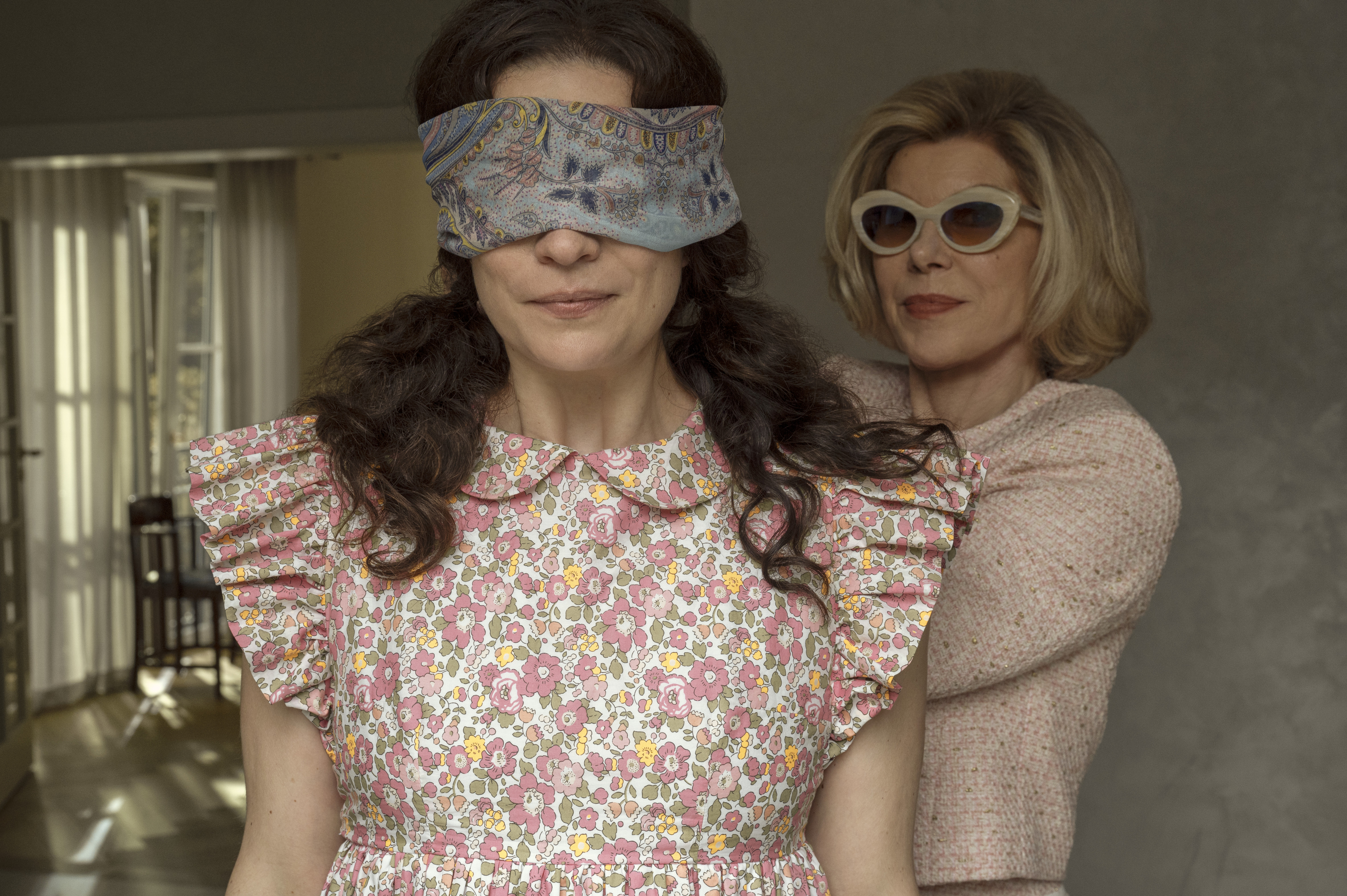
Baranski says, "Playing a mother-daughter relationship is always a rich experience."
MC: An article about you from a few years ago said you were known to throw incredible parties where people might end up naked in a lake.
CB: I didn't orchestrate it, but believe it or not, many of my colleagues did jump in naked, not by my prompting. I'm all in favor of doing that sort of thing, because I do have a house on a lake in Connecticut, and I have had many famous people enjoying themselves on my dock. But I did not. I went up to my waist. I was afraid of catching a deep chill and a cold.
MC: In episode 6, we learn about Victoria’s illness. Why did she want to keep this secret from Imogen?
CB: From the first time Imogen lays eyes on her mother, you can understand that relationship. There's estrangement there, there's anger, there's resentment. [Victoria’s] hope is that she’ll show up and have a rapprochement with her daughter. She’s not very clear about what all of these drug protocols are and all, given her physical state. I'm sure Victoria feels she does not want to take anything or do anything. She's hoping, at best, that this is a lovely spa experience with her daughter, and it won't take a long time to have that lovely conversation. But it's complicated because she shows up with a much younger man in tow, and that just ignites Imogen.
It's a very big thing to reveal to your child that you have a life-threatening disease. It's a bit of a death sentence. You only have a certain number of weeks, months, maybe years. It's not the kind of thing you tell somebody on the phone or email. She needs to see Imogen in person. For all the anger and Imogen's seeming independence, she has needed a lot of help. She's a girl who's gone through a lot of different graduate courses and has yet to really find herself. She is turning 35, and there's still a lot of fragility in Imogen.
MC: Why do you think she ultimately does go on the psychedelic trip with her?
CB: Because she is very fearful of her doing that alone. [Victoria] agrees to take that leap with her so that at least she can say to her that she did it too. When she decides that she really wants to take this deep dive into her traumatic past, Victoria makes that journey with her.
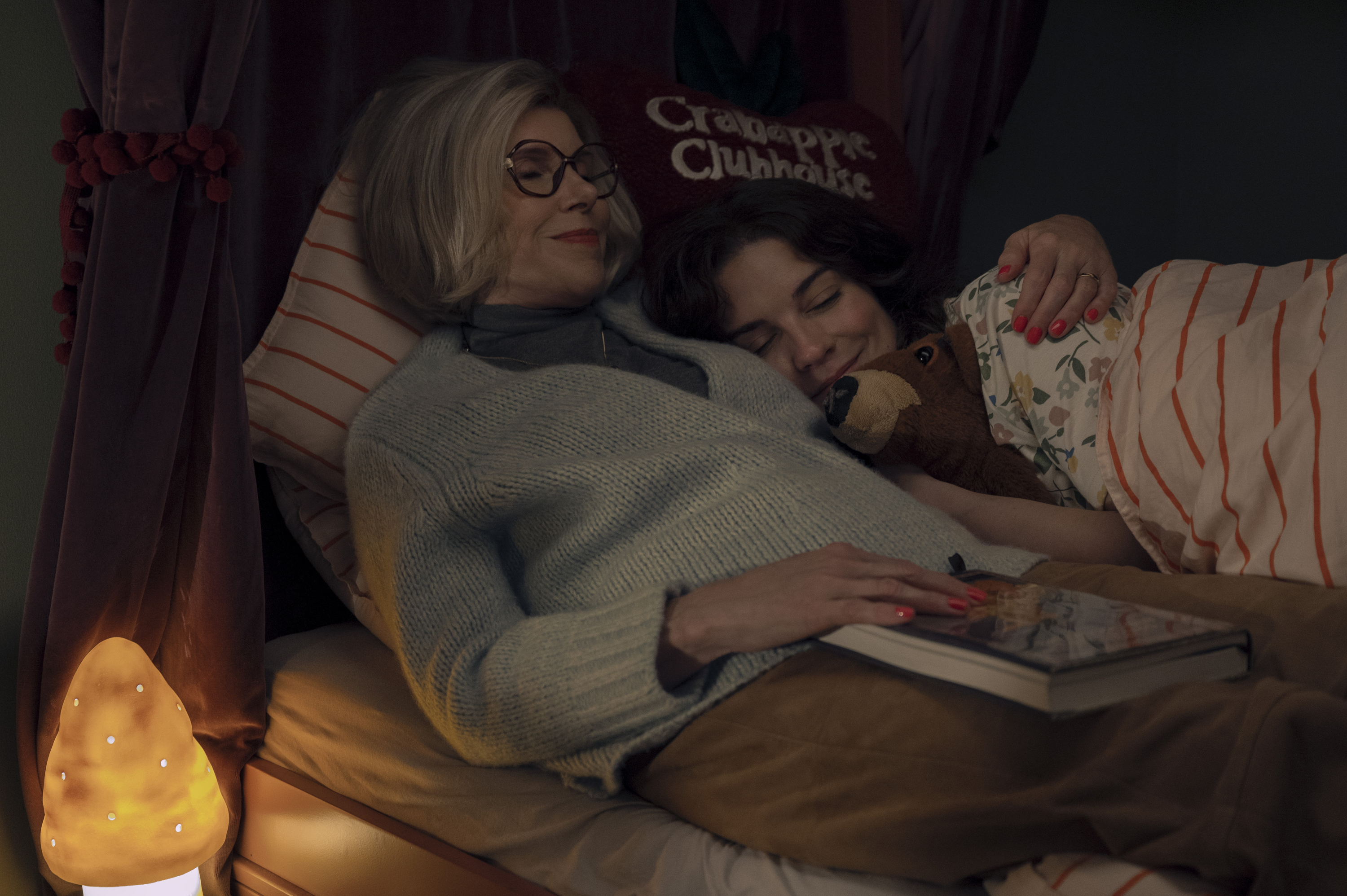
"She's such a vibrant human being. Of course, we hit it off," Baranski says of her co-star Annie Murphy.
MC: What was your relationship like with Annie Murphy while on set?
CB: She pops off the screen with those deep brown eyes, and her vivacity. She's such a vibrant human being. Of course, we hit it off.
When you play a mother-child relationship or a husband-wife, you're trying to create years and years and years of how people communicate with each other. Two people falling in love, well, that's easy because you're just discovering. But if Imogen's 35, there’s a lot of baggage, a lot of wounds, a lot of memories. It was wonderful that we were in Munich, because we devoted a lot of time to hanging out. All of us had time to marinate as a cast.
MC: With all of the conversation about and portrayals of psychedelics, did any of you do mushrooms together?
CB: I'm not going to out anybody. I was given something at a party, and I think it was mushrooms, but I had to go back to my hotel. I had a little bit and I just felt wonderful. Everyone said, "Were you okay?" I said, "Oh, I was so happy. I felt like I loved everybody." They said, "Oh, okay, you had a good one." But drugs have never been my thing. When I played Diane Lockhart [on The Good Wife and The Good Fight], she dabbled in psilocybin and ketamine. I certainly didn't do ketamine. I would be a little nervous about trying stuff like this. But what happens in Munich stays in Munich.
Strong women, women with a certain kind of flamboyance or a certain kind of wit—I’ve been playing characters like this since I left Juilliard.
MC: One of the narratives that's come out of this filming experience has been your friendship with your co-star King Princess. You don't see that many examples of true intergenerational friendship.
CB: I agree. She’s, without a doubt, one of the smartest humans. I'm stunned that she's only 25. We went out to dinner together, and as we were just having a martini at the bar, we started talking about her Nana. I started talking about my grandmother. It was like we had a shared human experience of having a deeply loving relationship with our grandmothers. That was it. From then on, we've kept in touch. That's a life that I would like to be a part of, have a little mentoring thing going.
It's not like she asks for my advice, but I think she finds it cool to know someone with that much experience in the theater. She was very open with everybody. She wanted to learn. She was humble. It was her first experience [as an actor] and I wouldn't have known that she didn't have any film experience because she was so easy in front of a camera. Stay tuned. It'll be more of the two of us doing stuff together.
MC: You have this illustrious career, but you've also talked about how you love learning from people who don't have as much experience. Do you still find that you're learning when you go to set?
CB: My God, yes. I was certainly the oldest person on the set of Nine Perfect Strangers, but I'm intrigued by what's going on in the culture. Much of it baffles me, but I feel like, why not learn from my fellow actors, especially the ones who are in their 20s and 30s? They are experiencing life in a way that is way different from how I grew up. We had one television set in the house. There were no iPhones, there was no internet. We’re talking about generations that are learning about life on their screens. I want to know what they're singing about. I want to know what they're concerned about. I want to know what their passions are. And KP is about as savvy and in the game as you can get. She's a great source to me. But I can also help her and say, "You know, have faith in time.” I didn't even become famous in that weird, ubiquitous TV way until my forties. Young people feel a great need to make things happen quickly, because their youth is a commodity now.
I want to encourage faith in time, having faith that things will unfold. If you're a person of talent, and commitment and passion, and if you do your training, that will pay off. Just don't expect instant payoffs. That's our culture, we want everything to be just like, boom.
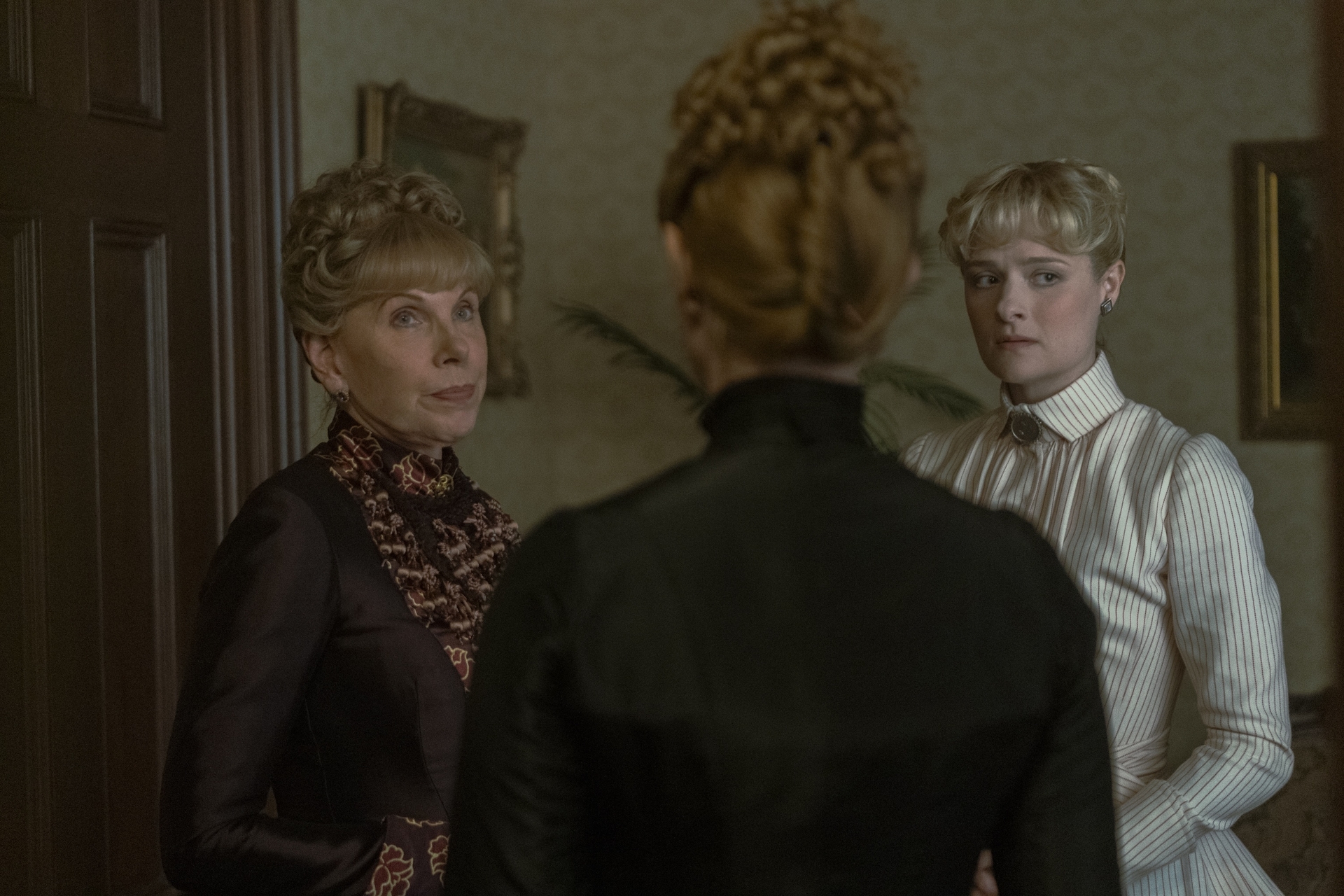
Christine Baranski and Louisa Jacobson in a first-look image from The Gilded Age season 3.
MC: I think that's really reassuring to hear.
CB: I have a lot to learn from my young actors. Of course, on The Gilded Age, I have so many wonderful young colleagues. I adore them all. They're just all so attractive.
MC: You have a very fun dynamic with Louisa Jacobson, who plays your niece on the show.
CB: I'm friends with Meryl [Streep, Jacobson’s mother], so I said, "Your daughter's intimidated by me, but I'm just being the character." I don't think she is anymore, but that was when she first started.
MC: The third season of The Gilded Age wasn't necessarily guaranteed, especially with the writer's strike. Once you learned it was coming back, what were your hopes for Agnes' storyline?
CB: At the end of season 2, I lose all my money. Then in the very last episode, my sister's husband dies suddenly and she finds out she's inherited a fortune. In fact, we are not going to be paupers. We don't have to sell the house. The caveat is my sister's now in charge. It's not great news for Agnes, but it is great news for Christine as an actress, because I get to play a character who was so fixed in her ways, had such a strong sense of identity about her own place in the world, her place in the home, her stature in society, and it's completely upended.
She's watching her sister suddenly get more and more confident about running the household. It lends itself to a lot of funny moments with Cynthia [Nixon, who plays Agnes’ sister]. That's a strong point in the show, the comedic aspects of that sister relationship. Everybody who's a sibling recognizes top dog, underdog. Now she's the top dog and I'm the underdog, and I'm thoroughly grumpy about it, especially when she supports causes like temperance. Please. You are not going to tell Agnes she can't have wine at dinner. But in The Gilded Age, whoever holds the purse strings has the power.
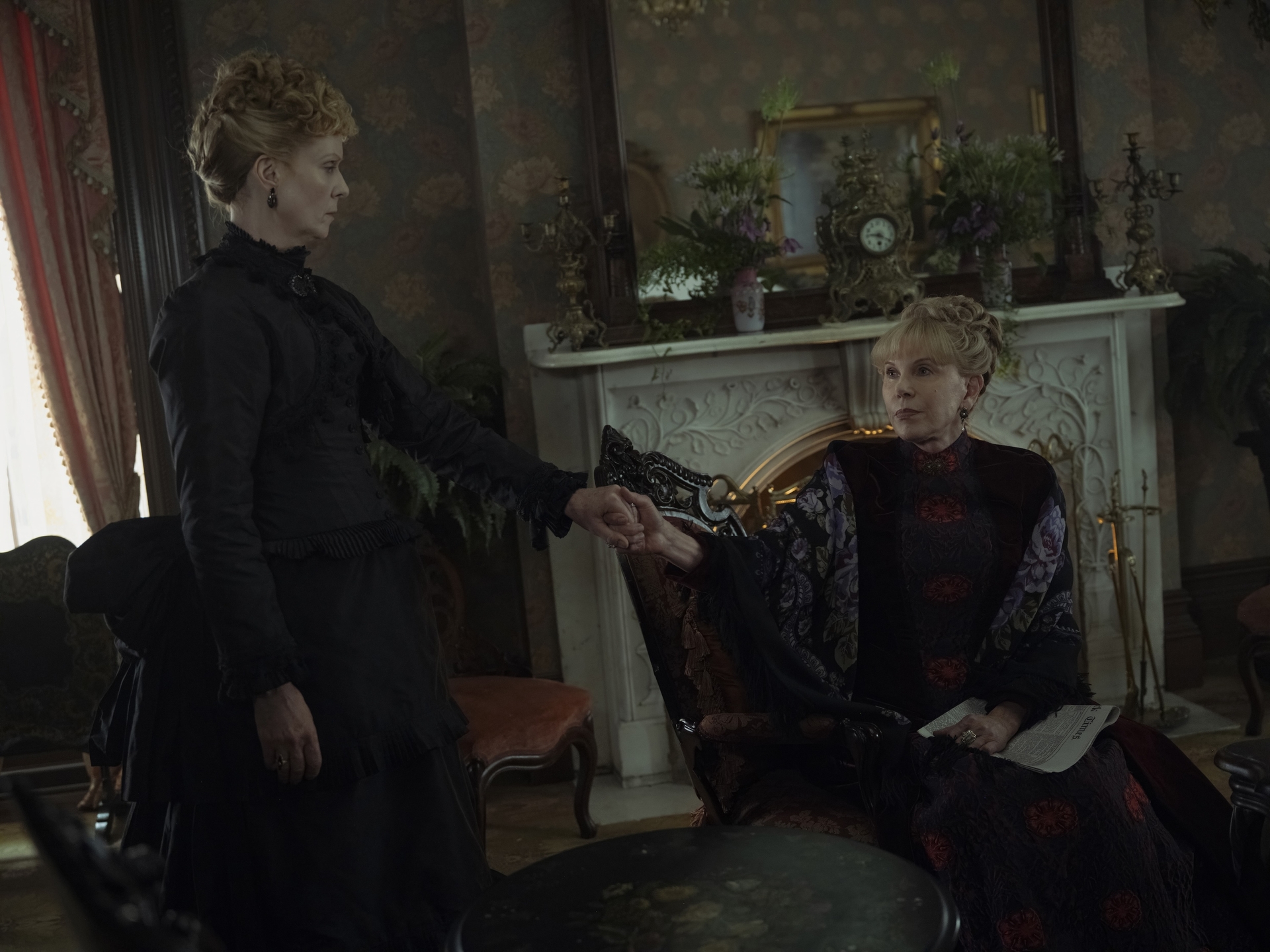
Baranski says The Gilded Age season 3 "lends itself to a lot of funny moments" between herself and Cynthia Nixon, who plays her sister.
MC: I interviewed Carrie Coon, who also stars on The Gilded Age, a few months ago about The White Lotus and we talked about how difficult it was for her to go back and forth between the set in Thailand and home as a working mother. You did the same thing when you were filming Cybil, commuting from the set in L.A. to your home in Connecticut, where your children lived. Did you and Carrie ever talk about that? Do you talk to working mothers now who are actors, about what's changed, what hasn't changed?
CB: I do. I make a point. When I worked with Audra McDonald on The Good Fight, I would check in with her, and I'd say, "Hey, I did this. This is so hard. It's so hard on a marriage, when you are the one who has a career in the ascendancy, and you're the one making the money.” There's this feeling of needing to downshift in the relationship so that you try to keep things on an even keel, to say nothing of leaving your children. There are no shortcuts. There's no easy way to do this.
Carrie actually did email me, and she said, "I've been offered The White Lotus, and I'm so torn. I can't not do White Lotus, but do I take my children? Do I leave them behind?" I said, "I left my kids in the care of my husband and my nanny because I thought it would be too disruptive to their lives, changing schools, changing friends." I said, "If you have good caregivers, your kids will probably be okay. Then just have it in your contract that you can get home."
Even while she was there, I wrote to her a few times to say, "How are you doing, pal?" As someone who walked that walk, had kids, held a marriage together, and managed to raise my kids, I want to help other women, at least to say, "I see what you're going through."
I went into therapy because I was so torn about working and leaving my kids. I felt so guilty about it. I felt if anything bad happened to my children, it would be my fault. Or if things didn't turn out well with my kids, it would be my fault. There is a terrible feeling of responsibility and guilt that women have. If you're a working actress with kids, I do think it's nice to know that other women have walked that walk, that it's not easy, but it'll be okay.
MC: Would you ever be interested in going back to the theater?
CB: I am currently in discussion for something, and it seems like it will happen. It is a play. It would be in London, and I've always wanted to work on the West End. I'm loath to say anything about it because it is not fait accompli, but it is an absolutely delicious role that has been played by some of the great actresses. It's a comedy. I get excited thinking about it. I'm overdue. I haven't done a run of a play since I worked with Mark Rylance on Boeing-Boeing, and that was 2007.
Now we are waiting to hear if The Gilded Age will be renewed. They don't want to make a decision until several episodes air so we're all sort of hanging. I couldn't commit to doing a play this autumn, because I thought, "Well, what if Gilded Age gets picked up? I want to be available for that." My television career definitely has been a happy roadblock to my doing theater, but there is a chance that I could make it work, and it would be great fun.
Jessica Goodman is the New York Times bestselling author of The Counselors, They'll Never Catch Us, and They Wish They Were Us. She is the former op-ed editor at Cosmopolitan magazine, and was part of the 2017 team that won a National Magazine Award in personal service. She has also held editorial positions at Entertainment Weekly and HuffPost, and her work has been published in outlets like Glamour, Condé Nast Traveler, Elle, and Marie Claire.
